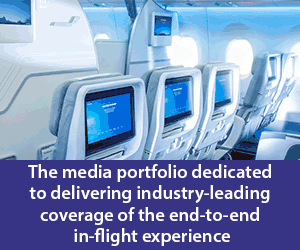
The Crystal Cabin Awards Association has announced the shortlist for this year’s awards.
The Crystal Cabin Award has eight categories, including Cabin Concepts, Cabin Systems, Health & Safety, IFEC & Digital Services, Material & Components, Passenger Comfort, Sustainable Cabin and University. The winners of the awards will be announced on 28 May in Hamburg as part of the annual Aircraft Interiors Expo.
The annual awards by Hamburg Aviation are among the most prestigious awards for aircraft cabin innovation, which this year feature 72 entries. The association says the list of nominees reflected a wide range of innovations from revolutionary seating concepts to sustainable cabin materials and advanced, inclusive entertainment systems.
The shortlisted companies include Ameco which presents its Fly-Buddy Hub, a versatile, social seating concept in which six passengers can sit opposite each other. The modular design creates a versatile space with convertible seats and beds, folding tables, a roll-up screen and intelligent partitions.
Qantas Airways’ “Sunrise” project will be offering non-stop flights from Sydney and Melbourne to London and New York by the end of 2025. To make such ultra-long-haul flights more pleasant, Diehl Aviation has designed an innovative Wellbeing Zone for the A350 which is accessible to travellers of all classes and offers space for a guided training programme on screens, a drinking station and a range of healthy snacks to help them cope with the long journey time of up to 20 hours.
The Zephyr seat by Zephyr Aerospace aims to deliver comfort in Premium Economy Class and according to the Crystal Cabin Awards Association, it is the world’s first flat aircraft seat for long-haul flights in this class with direct access to the aisle, featuring complete privacy. Its stacked design of the seat means that any Zephyr seat can be installed without loss of seat density.
Japan Airlines’ new A350-1000 cabin interior, which was a collaboration by the airline, British design agency Tangerine, Safran Seats and Recaro Aircraft Seating, features Japanese innovation for all four classes: First, Business, Premium Economy and Economy. Seats with the elegance of Japanese aesthetics can be found in all classes and in Business and First Class, passengers can enjoy the first headphone-free in-flight entertainment system with loudspeakers in the seat. First Class features a dining area for three people and a seat that can be converted into an extra-wide bed. In Premium Economy, automatic electric seat adjustment is a one of the special features, as well as a fixed partition between the seats in the middle of the cabin to maximise privacy.
For accessible travel, this year’s submissions feature assistive auditory, visual, cognitive and motor functions that can make air travel accessible and enjoyable for as many passengers as possible. The Wheelchair Space and Securement System (WSSS) from the renowned University of Virginia Tech in co-operation with Boeing, All Wheels Up and Collins Aerospace benefits passengers with limited mobility by integrating the space required to secure wheelchairs into adaptable economy seats.
Collins Aerospace’s entry, ADAPT digital flight experience control follows the philosophy of inclusive design by allowing passengers to connect their mobile phones to their seats. The passenger device communicates with all active visual sensors such as seat controls, in-flight entertainment controls and the crew and enables voice recognition or American Sign Language recognition.
Airbus’ entry, ACCESS Beam, is the first solution for a temporary conversion of the aircraft cabin during ground turnaround for the transport of wheelchairs, offering airlines maximum flexibility and safety and comfort passengers in wheelchairs of flying in their own wheelchair.
Safran Passenger Innovations (SPI) has designed an in-flight entertainment product in co-operation with Air New Zealand and Virgin Atlantic that enables passengers with auditory, visual, cognitive and motor impairments to enjoy in-flight entertainment.
University of Michigan’s M-SAAVE is an interdisciplinary project dedicated to humanitarian applications of aerospace engineering. Led by Collins Aerospace, it has developed a safety system for passengers with reduced mobility which allows passengers to remain seated in their own wheelchair for the duration of a commercial flight.
Considering the environment
Saving weight in the cabin reduces emissions by lowering fuel consumption and the association says that several entrants in the 2024 season offer significant weight (and therefore emissions) savings. Companies such as Zotefoams, Collins Aerospace, Diehl Aviation, Safran Cabin and a consortium headed by Hamburg-based Comprisetec use a diverse range of approaches to lower weight. These include ultra-lightweight foam insulators; ground-breaking manufacturing techniques that use far less material; new resin-based interior panels; ceiling seat anchor points for seating that replace overhead bins; and water dispensers that save weight by replacing bottled water on board.
Reusing and recycling materials also offers significant ways to reduce aviation’s environmental impact. Entries in this area include Airbus’ C-Suite Circular Business Class which is built around a commitment to use far more recycled materials in business class seats than previous offerings, and Recaro, which makes a similar pledge with its R Sphere concept that prioritises used and upcycled materials.
Gen Phoenix in cooperation Sabeti Wain Aerospace & Doy Design has entered a seat dress made using a special 100% recycled fabric that is also much easier to recycle than similar materials.
Finally, Aircraft Cabin Modification presents its TexEco material which it says is the first 100% natural fibre certified for aircraft cabins.





